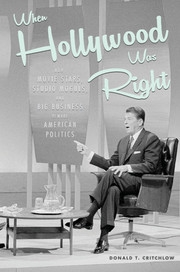1 - Setting the Stage in the 1930s
Republicans on Defense
Published online by Cambridge University Press: 05 October 2013
Summary
The economic depression of the 1930s transformed America into a nation of haves and have-nots. This was especially the case in Hollywood, where movie moguls made huge profits, film stars such as Gary Cooper received salaries that were the highest in the nation, and screenwriters earned incomes of more than $100,000 a year. Beneath the Hollywood elite, as novelist Nathaniel West so graphically captured in his haunting Day of the Locust (1939), swarmed actors looking for bit parts, extras hoping to be used in crowd scenes, old vaudeville performers looking to resuscitate their careers, and young writers hoping to break into the business.
In the first years of the Great Depression, Hollywood remained a generally nonpolitical town. A few studio chieftains, such as Louis B. Mayer, head of MGM, actively participated in Republican Party politics, but Mayer stood out in this regard. As the Depression continued, the nation swung to the left in support of Franklin D. Roosevelt’s New Deal and in response to the growing threat of fascism in Europe. Hollywood became increasingly politicized by the mid-1930s. The change in Hollywood’s political atmosphere accelerated when socialist author Upton Sinclair won the Democratic Party nomination for governor in 1934, and studios and the Republican establishment successfully organized to defeat him in the general election. Other factors contributed to this growing politicization: the unionization of studio technicians, cartoonists, screenwriters, actors, and directors split Hollywood into warring camps, and the anti-Semitic rhetoric of Nazi leader Adolph Hitler, who came to power in Germany in 1933, pushed many in Hollywood further to the left. In this environment, some in Hollywood joined the Communist Party.
- Type
- Chapter
- Information
- When Hollywood Was RightHow Movie Stars, Studio Moguls, and Big Business Remade American Politics, pp. 7 - 41Publisher: Cambridge University PressPrint publication year: 2013



